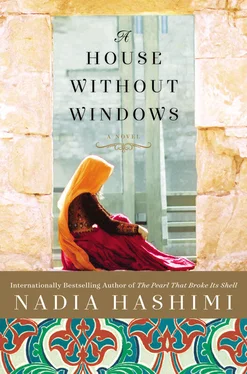He was her father’s nephew, a good spread of years between them. Zeba remembered carrying him on her hip as a girl. As a young man, he traveled to the city and worked for a month digging wells. He died, just a foot from water, when the earth’s gases overcame him. Zeba had cried for the boy, wondering how it must have felt to reach the core of the earth and tap into its life-giving fluid, only to realize he would never live to taste it.
At his funeral, women consoled his wailing mother with lofty promises.
“He died bringing water to people. There is sawaab in the work he was doing, and he will be rewarded in janaat .”
It was the kind thing to say, much better than saying he died for no good reason.
In the afternoons, Zeba listened to the mullah pray over each person. He sat at their cells and recited verses in a soft and gentle voice. He asked each man to speak of his troubles, to describe the visions or voices, to seek peace in the scripture. He brought cool water his son had drawn from the well to wash down their meals of dry bread and gritty black pepper.
I suppose the mullah, too, seeks sawaab for his work in this world, Zeba thought.
The first night had not been as difficult as it should have been. The cell was the length of two people but the roof was low, and the mullah had to crouch to pass through it. Zeba spent her time curled on a small rug Habibullah had brought her.
One man called out with a howl that reminded Zeba of a mullah’s azaan ringing out from a minaret. As if it truly were a call to prayer, the others followed. Moans, sobs, and laughter mingled anonymously in the moonlit courtyard. Zeba couldn’t guess at their numbers and presumed no other women were present. Hers was the last cell in the row, and the nearest patient was more than three empty cells away, an arrangement she preferred.
She was almost relieved to be out of Chil Mahtab, having grown wary that her jadu was a watered-down version of her mother’s. Those women needed so much more than Zeba could give.
Her gnawing hunger pains reminded Zeba of Ramadan, the holy month she’d always welcomed with open arms. It was a chance for her to demonstrate her strength, to fast from sunrise to sunset without letting so much as a single drop of water cross her lips. She took pride in knowing she’d never once faltered, even as a teenager. The moments she spent in this cell were a different kind of Ramadan, but brought the same burning hollow in her stomach. She craved the feeling of real thirst and hunger, for it kept her mind from wandering into the dangerous realm of self-pity. Fasting felt holy and necessary and just. She pressed her forehead to the cold earth and prayed her time at the shrine would sanctify her — if that were even possible.
Every day she’d tolerated his drink and heavy hand had been an admission that she’d been powerless.
That girl could have been her daughter. The truth was, when Zeba had walked into the courtyard, she’d seen her Little Girl. Her jade head scarf, her flailing legs, her balled-up fists — Zeba had believed them all to be parts of her own daughter. She was horrified, thinking she was seeing her Little Girl’s honor ravaged by a man she’d fed, excused, and obeyed. She’d seen a scarlet trickle of shame run down the small, pale leg.
By the time Zeba had seen her face, it was too late. There was no going back. She and Kamal were finished the moment her fingers had wrapped around the wooden handle. Kamal had seen his wife anew in that moment, staring at the curl of her lips under the weight of the raised hatchet and realizing, for the first time, that Zeba had teeth, too.
The sound of urgent whispers shook Zeba from her thoughts.
“He’s here! I saw him! Get away from me!”
She shook her head to think of her haunted neighbors.
“Please don’t. . please don’t take me away. I’m waiting here for Judgment Day. I can’t go with you!”
While most of the nights were still and peaceful, there were occasional outbursts. The yelling, on top of the persistent gnawing of her stomach, made the drums in her head pound harder and harder.
“Please, Satan! Not me! Don’t take me to hell!”
“Shut up shut up shut up!” roared another patient, whose illness was of a different kind. Some patients were paranoid and carried on conversations with people that no one else could hear or see. Others were so depressed that they cried and slept most of the day. Zeba believed there were six men in total at the shrine with her, though she’d never spoken to them.
“If he comes for you, do us all a favor and go with him,” a man hollered. Wild laughter echoed in the dark.
She groaned and rolled onto her side, the carpet rough against her cheek. Every joint and every muscle felt stiff. She rubbed the long muscles of her neck. She’d lost enough weight in these eleven days that she could feel the ropy muscles and ligaments beneath her skin. Even her belly, which had softened with each pregnancy, had shrunken in on itself like a raisin. The satiny streaks she’d grown with each baby disappeared into the folds.
The mullah prayed over her just as he did the others. He’d warned her, as he’d fastened the chain to her ankle, to stay in her cell. The rest of the patients were men and she should not mingle with them.
“Judgment Day is coming. Allah help me, I’m ready for it. Send the winds, the hail, and the fires. I’m waiting for it! Just keep that devil away from me!”
“ Imshab ba qisa-e dil-e-man goosh mekonee. . ” Zeba sang softly, hoping to drown out the moaning of her neighbor and the angry shouts for him to keep quiet. “ Farda, man-ra chu qisa feramoosh mekonee. . ”
Tonight, you will listen to the sorrows of my soul, the lyrics went. Though tomorrow, you will forget all that has been told.
The slow melody sounded even more sorrowful against the backdrop of rattling chains and low sobbing.
Forty days, the mullah had declared. Forty days until her treatment was complete and she could be returned to the prison for whatever awaited her there. That she’d managed to survive eleven days gave her little hope for the remaining twenty-nine.
The mullah had peered into her cell earlier in the day, hands clasped together behind his back as he stared at her as if she were a new species of animal in his zoo.
“Dear girl, so troubled. Where does your mind take you?” he’d asked.
“Where can my mind take me?” she’d replied. “I am heavier than that mountain over your shoulder. My mind cannot move me.”
He’d considered her answer for a moment before asking another question.
“Zeba, are you miserable here? I’ve brought you food. I know the bread is not much to go on and you should keep up your strength. Here, take this bulanee . It is still warm.”
Zeba had chuckled, amused by the mullah’s sudden desire to make her comfortable. No, she decided, she would not take anything from this man — not when he’d been the one to lock the shackles on her legs.
“I will leave it here for you,” he’d said quietly so the others would not hear. He’d passed the stuffed flatbread into her cell inside a page of newspaper.
“Take it out of here!” Zeba had hissed, though the smell of the spiced potatoes and fried dough made her salivate.
“Why are you being so stubborn?” he’d asked, exasperated. “I know it is not the most comfortable place, but I’m doing this all for your own good. If you could see that, you’d be grateful.”
“I am grateful,” she said, “that someone had the great wisdom to divide time into days and days into hours and hours into minutes because without knowing that the seconds were passing I would likely die waiting for these forty days to pass.”
Читать дальше











